University Report: Middle Childhood Development and Theories
VerifiedAdded on 2022/08/12
|9
|2438
|32
Report
AI Summary
This report delves into the developmental stage of middle childhood, focusing on children aged 6 to 12. It begins with an introduction to the stage, highlighting key developmental activities across physical, cognitive, emotional, and social domains. The report examines Erik Erikson's psychosocial theory, specifically the industry versus inferiority stage, and Jean Piaget's theory of cognitive development, emphasizing the concrete operational stage. It also identifies negative environmental factors, such as poverty and inadequate housing, and their impact on child development. Furthermore, the report explores preventive and intervention measures, including ensuring adequate nutrition, promoting education, and government initiatives to reduce poverty and provide support for families. The aim of the report is to analyze and understand the developmental milestones associated with middle childhood.
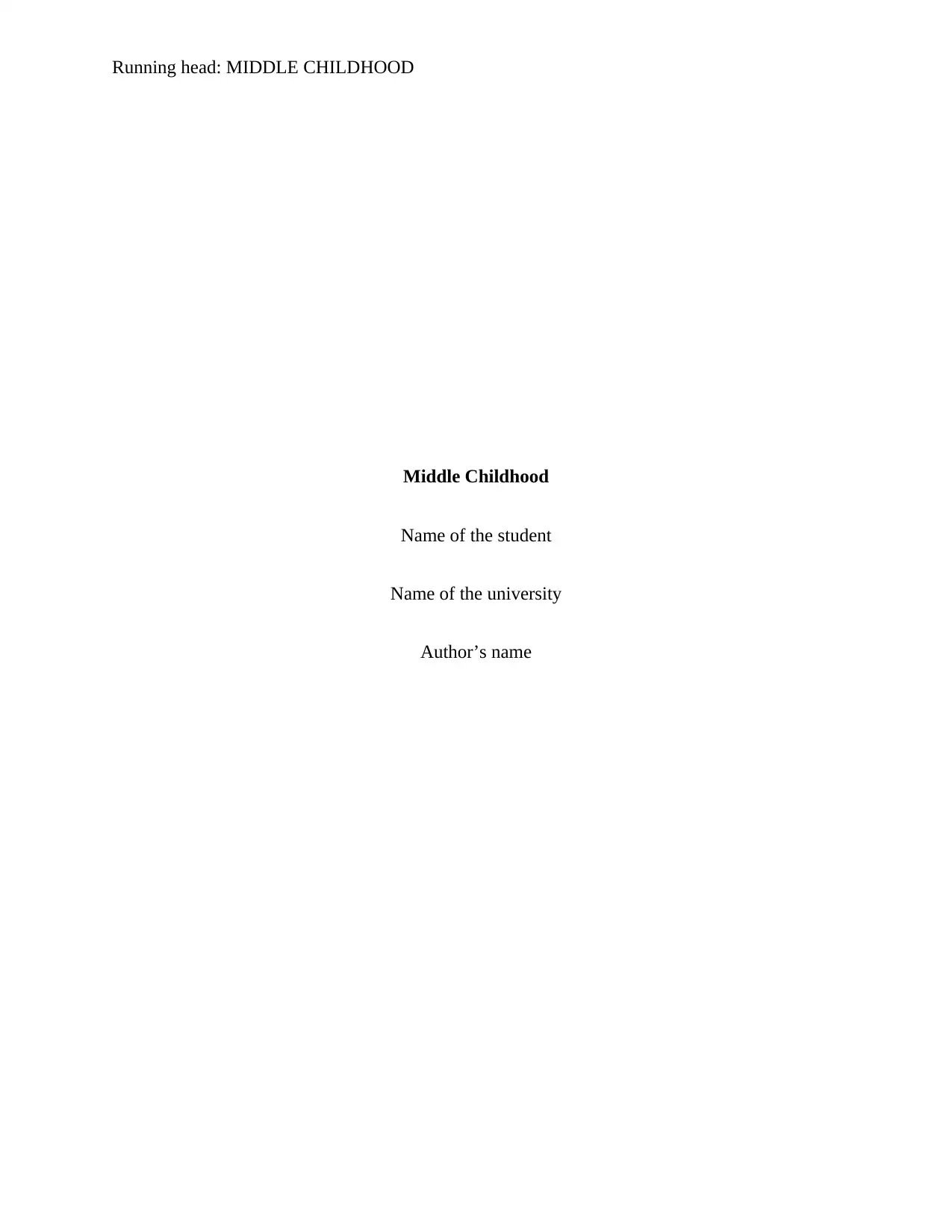
Running head: MIDDLE CHILDHOOD
Middle Childhood
Name of the student
Name of the university
Author’s name
Middle Childhood
Name of the student
Name of the university
Author’s name
Paraphrase This Document
Need a fresh take? Get an instant paraphrase of this document with our AI Paraphraser
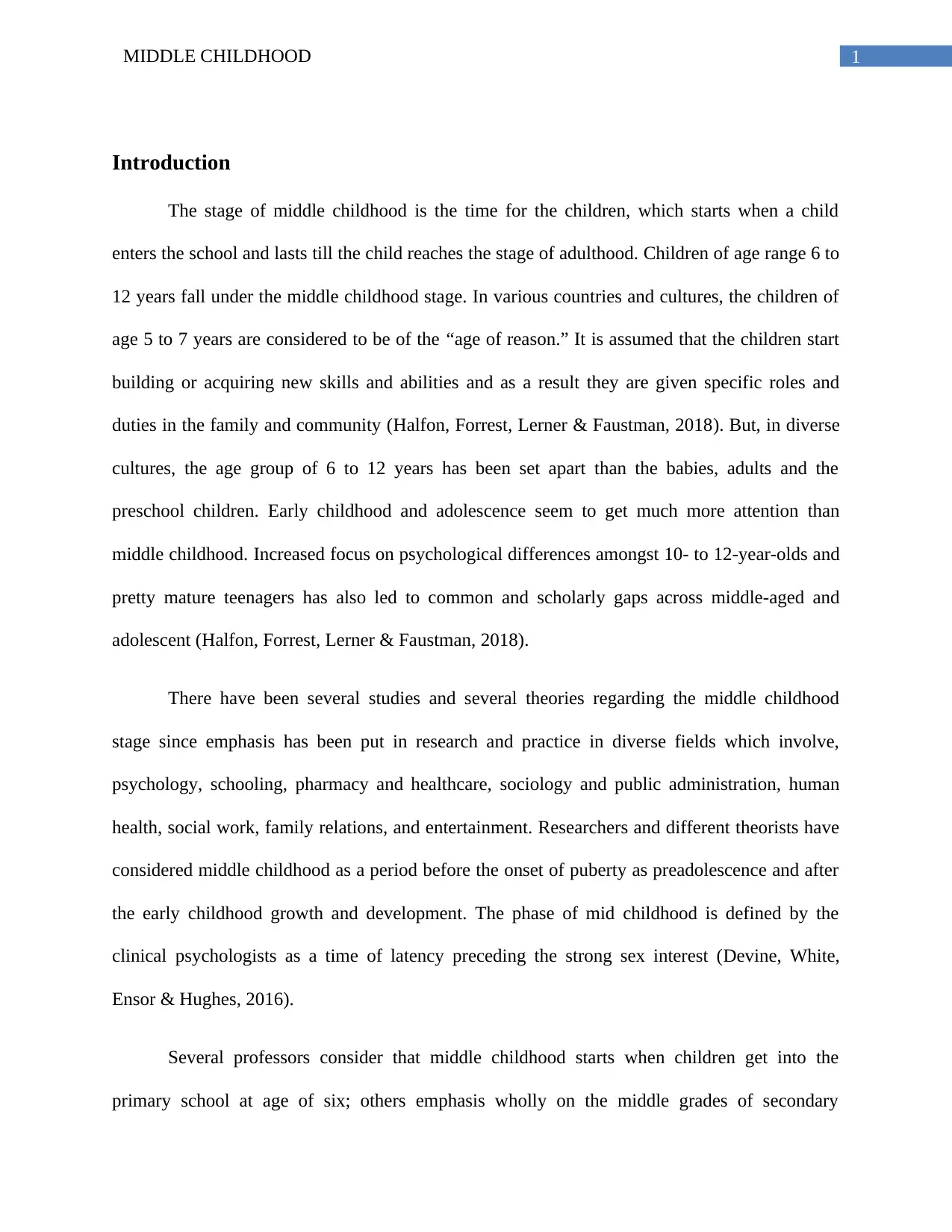
1MIDDLE CHILDHOOD
Introduction
The stage of middle childhood is the time for the children, which starts when a child
enters the school and lasts till the child reaches the stage of adulthood. Children of age range 6 to
12 years fall under the middle childhood stage. In various countries and cultures, the children of
age 5 to 7 years are considered to be of the “age of reason.” It is assumed that the children start
building or acquiring new skills and abilities and as a result they are given specific roles and
duties in the family and community (Halfon, Forrest, Lerner & Faustman, 2018). But, in diverse
cultures, the age group of 6 to 12 years has been set apart than the babies, adults and the
preschool children. Early childhood and adolescence seem to get much more attention than
middle childhood. Increased focus on psychological differences amongst 10- to 12-year-olds and
pretty mature teenagers has also led to common and scholarly gaps across middle-aged and
adolescent (Halfon, Forrest, Lerner & Faustman, 2018).
There have been several studies and several theories regarding the middle childhood
stage since emphasis has been put in research and practice in diverse fields which involve,
psychology, schooling, pharmacy and healthcare, sociology and public administration, human
health, social work, family relations, and entertainment. Researchers and different theorists have
considered middle childhood as a period before the onset of puberty as preadolescence and after
the early childhood growth and development. The phase of mid childhood is defined by the
clinical psychologists as a time of latency preceding the strong sex interest (Devine, White,
Ensor & Hughes, 2016).
Several professors consider that middle childhood starts when children get into the
primary school at age of six; others emphasis wholly on the middle grades of secondary
Introduction
The stage of middle childhood is the time for the children, which starts when a child
enters the school and lasts till the child reaches the stage of adulthood. Children of age range 6 to
12 years fall under the middle childhood stage. In various countries and cultures, the children of
age 5 to 7 years are considered to be of the “age of reason.” It is assumed that the children start
building or acquiring new skills and abilities and as a result they are given specific roles and
duties in the family and community (Halfon, Forrest, Lerner & Faustman, 2018). But, in diverse
cultures, the age group of 6 to 12 years has been set apart than the babies, adults and the
preschool children. Early childhood and adolescence seem to get much more attention than
middle childhood. Increased focus on psychological differences amongst 10- to 12-year-olds and
pretty mature teenagers has also led to common and scholarly gaps across middle-aged and
adolescent (Halfon, Forrest, Lerner & Faustman, 2018).
There have been several studies and several theories regarding the middle childhood
stage since emphasis has been put in research and practice in diverse fields which involve,
psychology, schooling, pharmacy and healthcare, sociology and public administration, human
health, social work, family relations, and entertainment. Researchers and different theorists have
considered middle childhood as a period before the onset of puberty as preadolescence and after
the early childhood growth and development. The phase of mid childhood is defined by the
clinical psychologists as a time of latency preceding the strong sex interest (Devine, White,
Ensor & Hughes, 2016).
Several professors consider that middle childhood starts when children get into the
primary school at age of six; others emphasis wholly on the middle grades of secondary
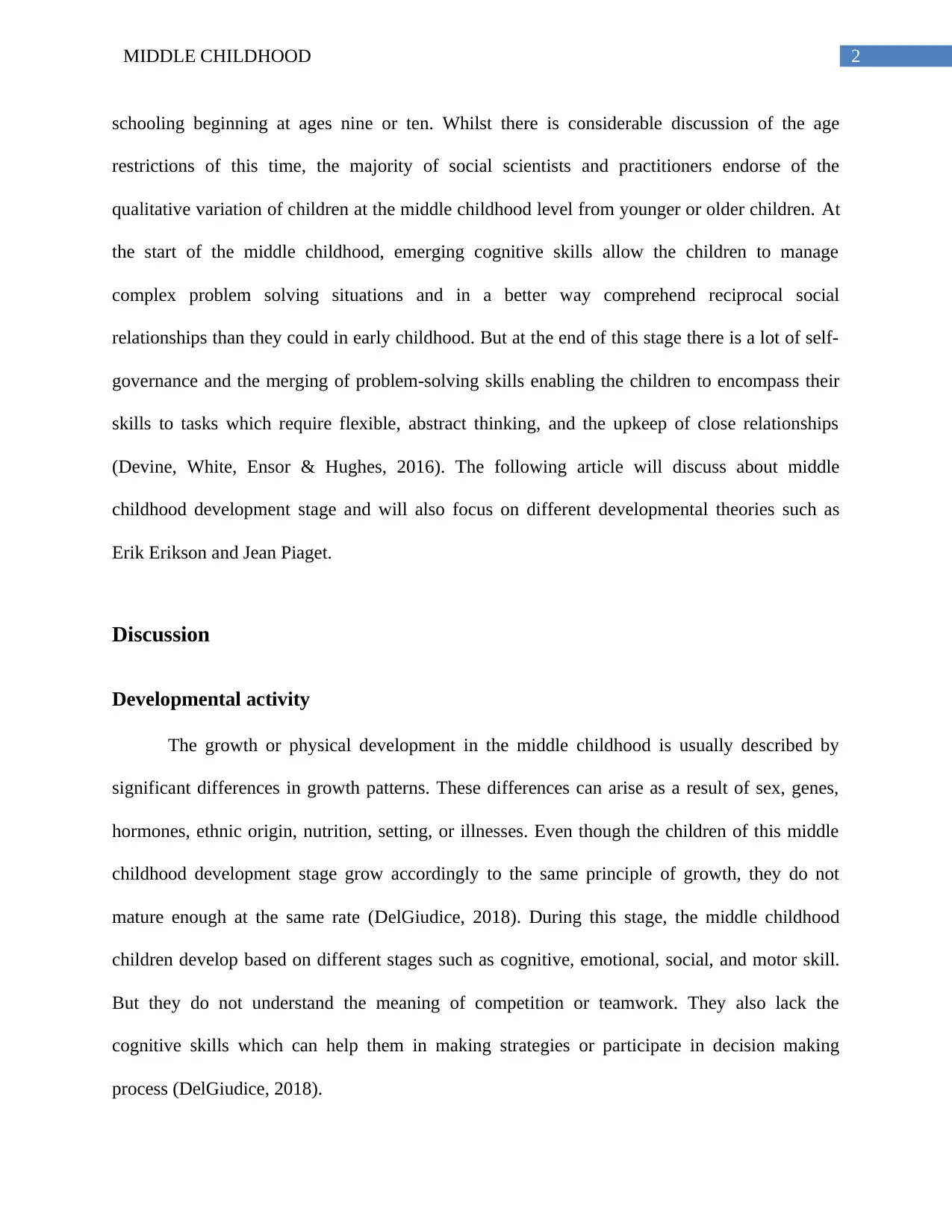
2MIDDLE CHILDHOOD
schooling beginning at ages nine or ten. Whilst there is considerable discussion of the age
restrictions of this time, the majority of social scientists and practitioners endorse of the
qualitative variation of children at the middle childhood level from younger or older children. At
the start of the middle childhood, emerging cognitive skills allow the children to manage
complex problem solving situations and in a better way comprehend reciprocal social
relationships than they could in early childhood. But at the end of this stage there is a lot of self-
governance and the merging of problem-solving skills enabling the children to encompass their
skills to tasks which require flexible, abstract thinking, and the upkeep of close relationships
(Devine, White, Ensor & Hughes, 2016). The following article will discuss about middle
childhood development stage and will also focus on different developmental theories such as
Erik Erikson and Jean Piaget.
Discussion
Developmental activity
The growth or physical development in the middle childhood is usually described by
significant differences in growth patterns. These differences can arise as a result of sex, genes,
hormones, ethnic origin, nutrition, setting, or illnesses. Even though the children of this middle
childhood development stage grow accordingly to the same principle of growth, they do not
mature enough at the same rate (DelGiudice, 2018). During this stage, the middle childhood
children develop based on different stages such as cognitive, emotional, social, and motor skill.
But they do not understand the meaning of competition or teamwork. They also lack the
cognitive skills which can help them in making strategies or participate in decision making
process (DelGiudice, 2018).
schooling beginning at ages nine or ten. Whilst there is considerable discussion of the age
restrictions of this time, the majority of social scientists and practitioners endorse of the
qualitative variation of children at the middle childhood level from younger or older children. At
the start of the middle childhood, emerging cognitive skills allow the children to manage
complex problem solving situations and in a better way comprehend reciprocal social
relationships than they could in early childhood. But at the end of this stage there is a lot of self-
governance and the merging of problem-solving skills enabling the children to encompass their
skills to tasks which require flexible, abstract thinking, and the upkeep of close relationships
(Devine, White, Ensor & Hughes, 2016). The following article will discuss about middle
childhood development stage and will also focus on different developmental theories such as
Erik Erikson and Jean Piaget.
Discussion
Developmental activity
The growth or physical development in the middle childhood is usually described by
significant differences in growth patterns. These differences can arise as a result of sex, genes,
hormones, ethnic origin, nutrition, setting, or illnesses. Even though the children of this middle
childhood development stage grow accordingly to the same principle of growth, they do not
mature enough at the same rate (DelGiudice, 2018). During this stage, the middle childhood
children develop based on different stages such as cognitive, emotional, social, and motor skill.
But they do not understand the meaning of competition or teamwork. They also lack the
cognitive skills which can help them in making strategies or participate in decision making
process (DelGiudice, 2018).
⊘ This is a preview!⊘
Do you want full access?
Subscribe today to unlock all pages.

Trusted by 1+ million students worldwide
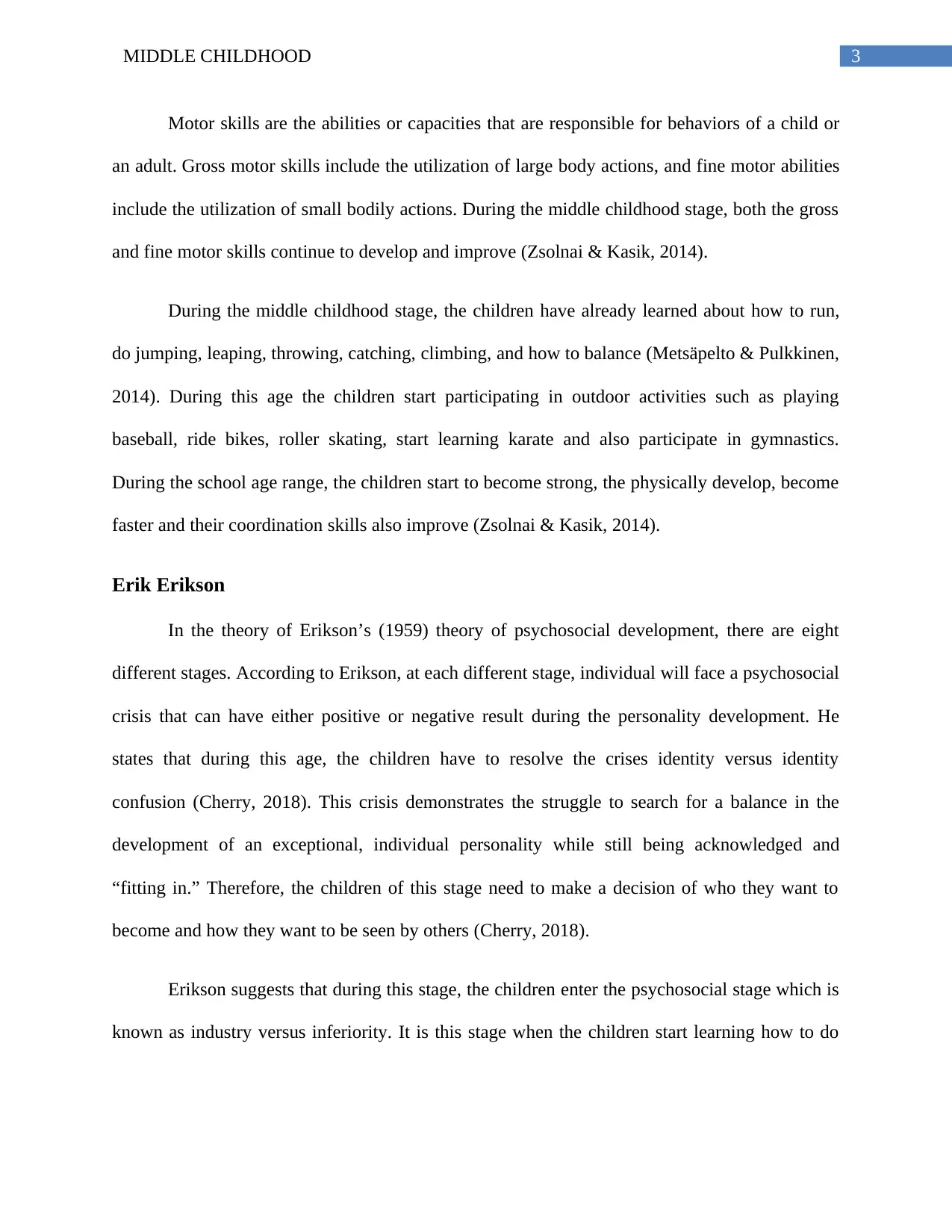
3MIDDLE CHILDHOOD
Motor skills are the abilities or capacities that are responsible for behaviors of a child or
an adult. Gross motor skills include the utilization of large body actions, and fine motor abilities
include the utilization of small bodily actions. During the middle childhood stage, both the gross
and fine motor skills continue to develop and improve (Zsolnai & Kasik, 2014).
During the middle childhood stage, the children have already learned about how to run,
do jumping, leaping, throwing, catching, climbing, and how to balance (Metsäpelto & Pulkkinen,
2014). During this age the children start participating in outdoor activities such as playing
baseball, ride bikes, roller skating, start learning karate and also participate in gymnastics.
During the school age range, the children start to become strong, the physically develop, become
faster and their coordination skills also improve (Zsolnai & Kasik, 2014).
Erik Erikson
In the theory of Erikson’s (1959) theory of psychosocial development, there are eight
different stages. According to Erikson, at each different stage, individual will face a psychosocial
crisis that can have either positive or negative result during the personality development. He
states that during this age, the children have to resolve the crises identity versus identity
confusion (Cherry, 2018). This crisis demonstrates the struggle to search for a balance in the
development of an exceptional, individual personality while still being acknowledged and
“fitting in.” Therefore, the children of this stage need to make a decision of who they want to
become and how they want to be seen by others (Cherry, 2018).
Erikson suggests that during this stage, the children enter the psychosocial stage which is
known as industry versus inferiority. It is this stage when the children start learning how to do
Motor skills are the abilities or capacities that are responsible for behaviors of a child or
an adult. Gross motor skills include the utilization of large body actions, and fine motor abilities
include the utilization of small bodily actions. During the middle childhood stage, both the gross
and fine motor skills continue to develop and improve (Zsolnai & Kasik, 2014).
During the middle childhood stage, the children have already learned about how to run,
do jumping, leaping, throwing, catching, climbing, and how to balance (Metsäpelto & Pulkkinen,
2014). During this age the children start participating in outdoor activities such as playing
baseball, ride bikes, roller skating, start learning karate and also participate in gymnastics.
During the school age range, the children start to become strong, the physically develop, become
faster and their coordination skills also improve (Zsolnai & Kasik, 2014).
Erik Erikson
In the theory of Erikson’s (1959) theory of psychosocial development, there are eight
different stages. According to Erikson, at each different stage, individual will face a psychosocial
crisis that can have either positive or negative result during the personality development. He
states that during this age, the children have to resolve the crises identity versus identity
confusion (Cherry, 2018). This crisis demonstrates the struggle to search for a balance in the
development of an exceptional, individual personality while still being acknowledged and
“fitting in.” Therefore, the children of this stage need to make a decision of who they want to
become and how they want to be seen by others (Cherry, 2018).
Erikson suggests that during this stage, the children enter the psychosocial stage which is
known as industry versus inferiority. It is this stage when the children start learning how to do
Paraphrase This Document
Need a fresh take? Get an instant paraphrase of this document with our AI Paraphraser
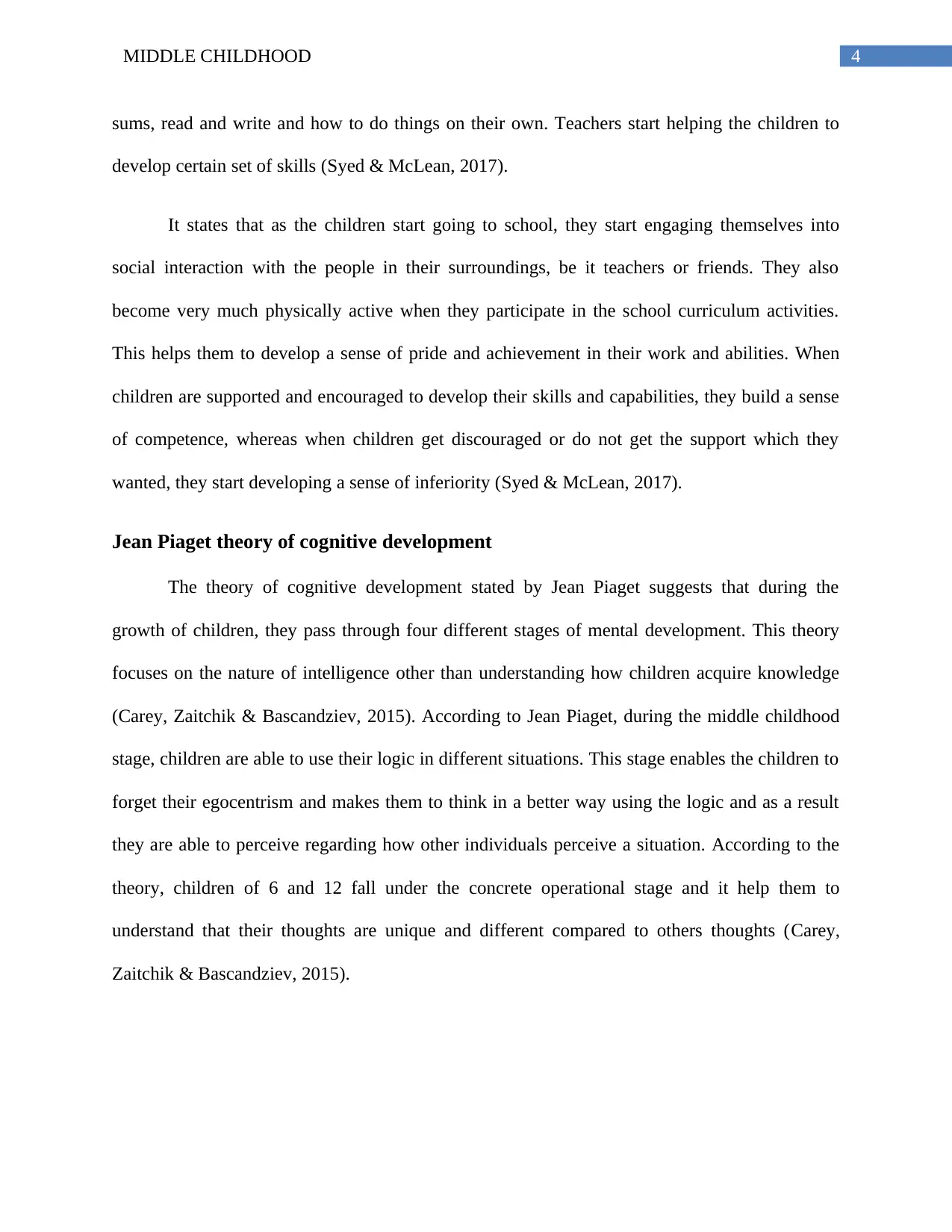
4MIDDLE CHILDHOOD
sums, read and write and how to do things on their own. Teachers start helping the children to
develop certain set of skills (Syed & McLean, 2017).
It states that as the children start going to school, they start engaging themselves into
social interaction with the people in their surroundings, be it teachers or friends. They also
become very much physically active when they participate in the school curriculum activities.
This helps them to develop a sense of pride and achievement in their work and abilities. When
children are supported and encouraged to develop their skills and capabilities, they build a sense
of competence, whereas when children get discouraged or do not get the support which they
wanted, they start developing a sense of inferiority (Syed & McLean, 2017).
Jean Piaget theory of cognitive development
The theory of cognitive development stated by Jean Piaget suggests that during the
growth of children, they pass through four different stages of mental development. This theory
focuses on the nature of intelligence other than understanding how children acquire knowledge
(Carey, Zaitchik & Bascandziev, 2015). According to Jean Piaget, during the middle childhood
stage, children are able to use their logic in different situations. This stage enables the children to
forget their egocentrism and makes them to think in a better way using the logic and as a result
they are able to perceive regarding how other individuals perceive a situation. According to the
theory, children of 6 and 12 fall under the concrete operational stage and it help them to
understand that their thoughts are unique and different compared to others thoughts (Carey,
Zaitchik & Bascandziev, 2015).
sums, read and write and how to do things on their own. Teachers start helping the children to
develop certain set of skills (Syed & McLean, 2017).
It states that as the children start going to school, they start engaging themselves into
social interaction with the people in their surroundings, be it teachers or friends. They also
become very much physically active when they participate in the school curriculum activities.
This helps them to develop a sense of pride and achievement in their work and abilities. When
children are supported and encouraged to develop their skills and capabilities, they build a sense
of competence, whereas when children get discouraged or do not get the support which they
wanted, they start developing a sense of inferiority (Syed & McLean, 2017).
Jean Piaget theory of cognitive development
The theory of cognitive development stated by Jean Piaget suggests that during the
growth of children, they pass through four different stages of mental development. This theory
focuses on the nature of intelligence other than understanding how children acquire knowledge
(Carey, Zaitchik & Bascandziev, 2015). According to Jean Piaget, during the middle childhood
stage, children are able to use their logic in different situations. This stage enables the children to
forget their egocentrism and makes them to think in a better way using the logic and as a result
they are able to perceive regarding how other individuals perceive a situation. According to the
theory, children of 6 and 12 fall under the concrete operational stage and it help them to
understand that their thoughts are unique and different compared to others thoughts (Carey,
Zaitchik & Bascandziev, 2015).
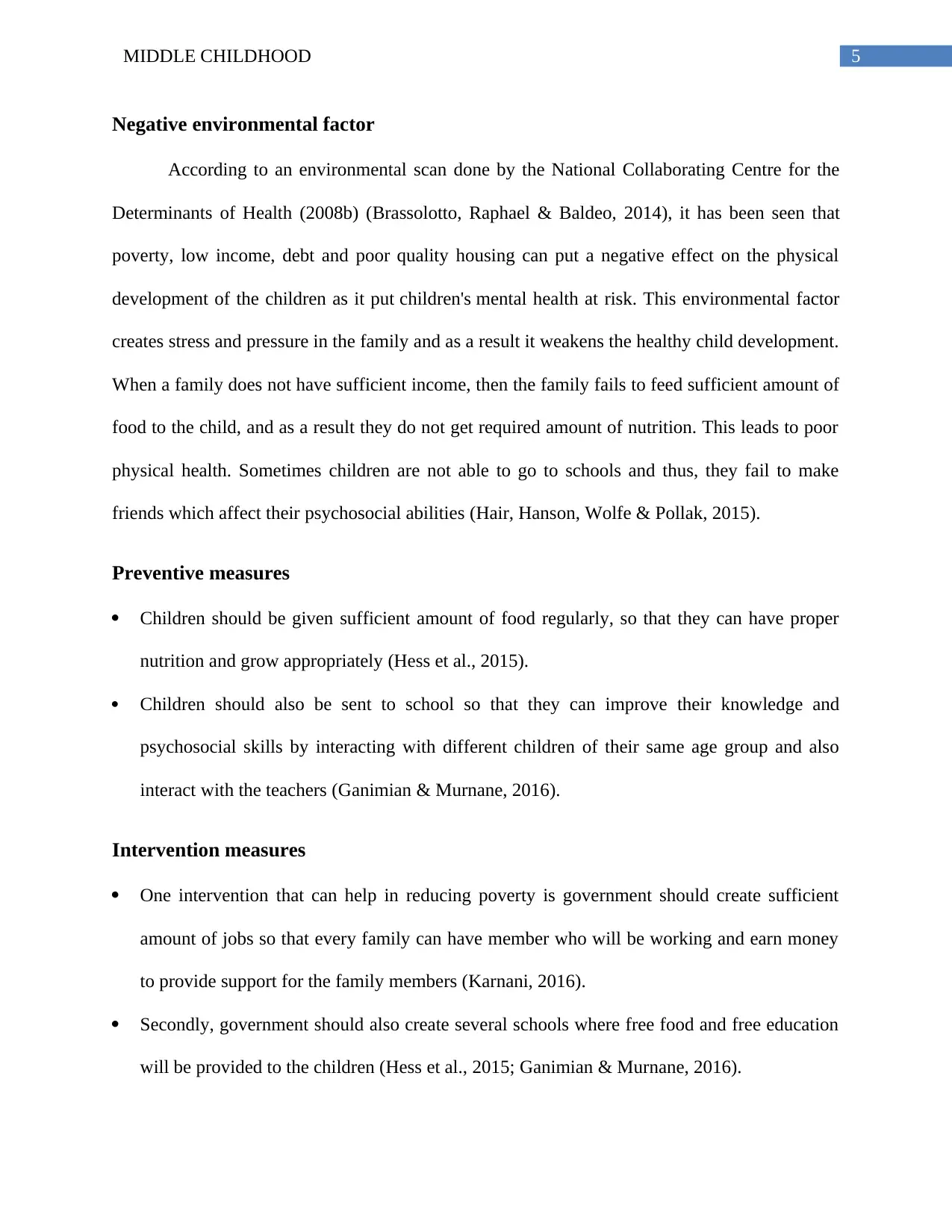
5MIDDLE CHILDHOOD
Negative environmental factor
According to an environmental scan done by the National Collaborating Centre for the
Determinants of Health (2008b) (Brassolotto, Raphael & Baldeo, 2014), it has been seen that
poverty, low income, debt and poor quality housing can put a negative effect on the physical
development of the children as it put children's mental health at risk. This environmental factor
creates stress and pressure in the family and as a result it weakens the healthy child development.
When a family does not have sufficient income, then the family fails to feed sufficient amount of
food to the child, and as a result they do not get required amount of nutrition. This leads to poor
physical health. Sometimes children are not able to go to schools and thus, they fail to make
friends which affect their psychosocial abilities (Hair, Hanson, Wolfe & Pollak, 2015).
Preventive measures
Children should be given sufficient amount of food regularly, so that they can have proper
nutrition and grow appropriately (Hess et al., 2015).
Children should also be sent to school so that they can improve their knowledge and
psychosocial skills by interacting with different children of their same age group and also
interact with the teachers (Ganimian & Murnane, 2016).
Intervention measures
One intervention that can help in reducing poverty is government should create sufficient
amount of jobs so that every family can have member who will be working and earn money
to provide support for the family members (Karnani, 2016).
Secondly, government should also create several schools where free food and free education
will be provided to the children (Hess et al., 2015; Ganimian & Murnane, 2016).
Negative environmental factor
According to an environmental scan done by the National Collaborating Centre for the
Determinants of Health (2008b) (Brassolotto, Raphael & Baldeo, 2014), it has been seen that
poverty, low income, debt and poor quality housing can put a negative effect on the physical
development of the children as it put children's mental health at risk. This environmental factor
creates stress and pressure in the family and as a result it weakens the healthy child development.
When a family does not have sufficient income, then the family fails to feed sufficient amount of
food to the child, and as a result they do not get required amount of nutrition. This leads to poor
physical health. Sometimes children are not able to go to schools and thus, they fail to make
friends which affect their psychosocial abilities (Hair, Hanson, Wolfe & Pollak, 2015).
Preventive measures
Children should be given sufficient amount of food regularly, so that they can have proper
nutrition and grow appropriately (Hess et al., 2015).
Children should also be sent to school so that they can improve their knowledge and
psychosocial skills by interacting with different children of their same age group and also
interact with the teachers (Ganimian & Murnane, 2016).
Intervention measures
One intervention that can help in reducing poverty is government should create sufficient
amount of jobs so that every family can have member who will be working and earn money
to provide support for the family members (Karnani, 2016).
Secondly, government should also create several schools where free food and free education
will be provided to the children (Hess et al., 2015; Ganimian & Murnane, 2016).
⊘ This is a preview!⊘
Do you want full access?
Subscribe today to unlock all pages.

Trusted by 1+ million students worldwide
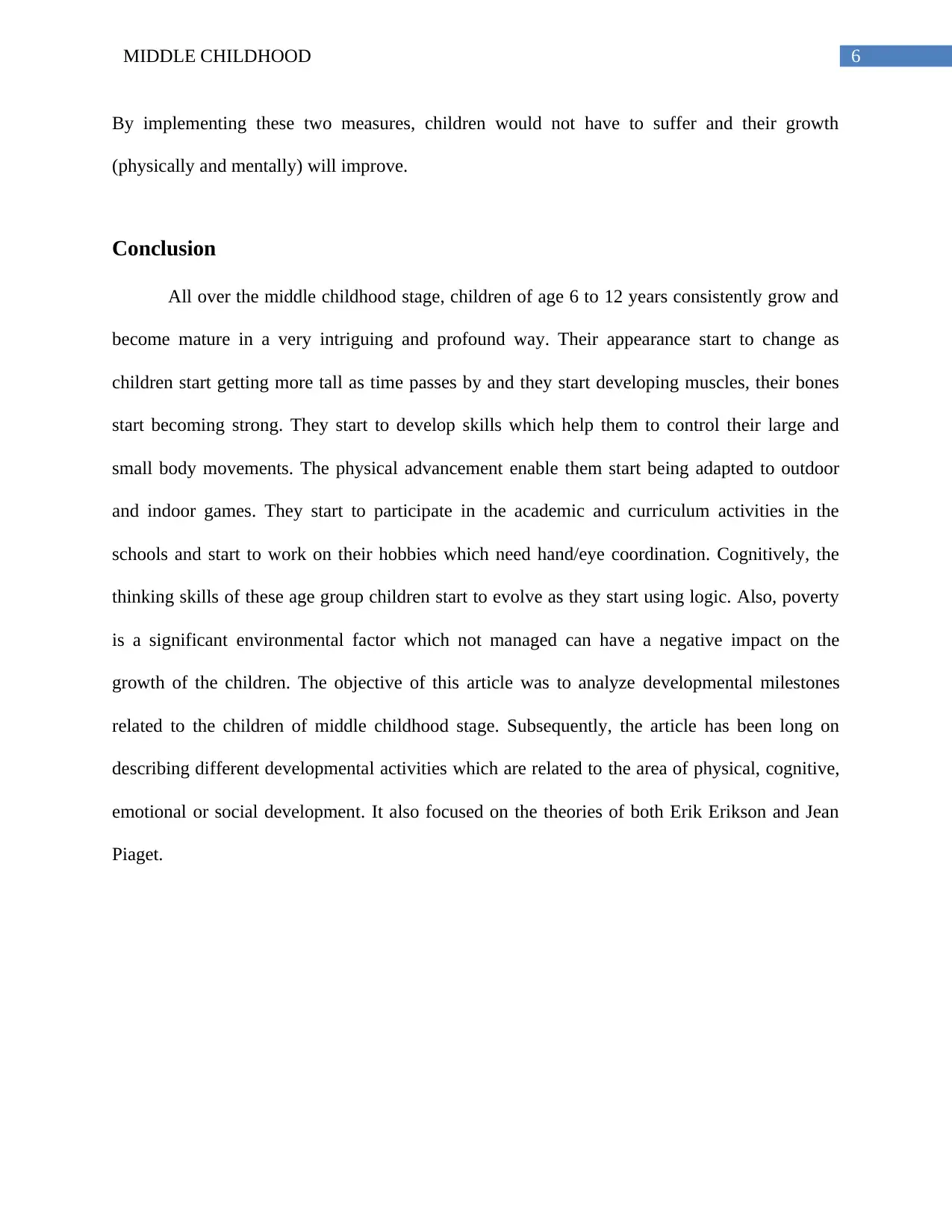
6MIDDLE CHILDHOOD
By implementing these two measures, children would not have to suffer and their growth
(physically and mentally) will improve.
Conclusion
All over the middle childhood stage, children of age 6 to 12 years consistently grow and
become mature in a very intriguing and profound way. Their appearance start to change as
children start getting more tall as time passes by and they start developing muscles, their bones
start becoming strong. They start to develop skills which help them to control their large and
small body movements. The physical advancement enable them start being adapted to outdoor
and indoor games. They start to participate in the academic and curriculum activities in the
schools and start to work on their hobbies which need hand/eye coordination. Cognitively, the
thinking skills of these age group children start to evolve as they start using logic. Also, poverty
is a significant environmental factor which not managed can have a negative impact on the
growth of the children. The objective of this article was to analyze developmental milestones
related to the children of middle childhood stage. Subsequently, the article has been long on
describing different developmental activities which are related to the area of physical, cognitive,
emotional or social development. It also focused on the theories of both Erik Erikson and Jean
Piaget.
By implementing these two measures, children would not have to suffer and their growth
(physically and mentally) will improve.
Conclusion
All over the middle childhood stage, children of age 6 to 12 years consistently grow and
become mature in a very intriguing and profound way. Their appearance start to change as
children start getting more tall as time passes by and they start developing muscles, their bones
start becoming strong. They start to develop skills which help them to control their large and
small body movements. The physical advancement enable them start being adapted to outdoor
and indoor games. They start to participate in the academic and curriculum activities in the
schools and start to work on their hobbies which need hand/eye coordination. Cognitively, the
thinking skills of these age group children start to evolve as they start using logic. Also, poverty
is a significant environmental factor which not managed can have a negative impact on the
growth of the children. The objective of this article was to analyze developmental milestones
related to the children of middle childhood stage. Subsequently, the article has been long on
describing different developmental activities which are related to the area of physical, cognitive,
emotional or social development. It also focused on the theories of both Erik Erikson and Jean
Piaget.
Paraphrase This Document
Need a fresh take? Get an instant paraphrase of this document with our AI Paraphraser
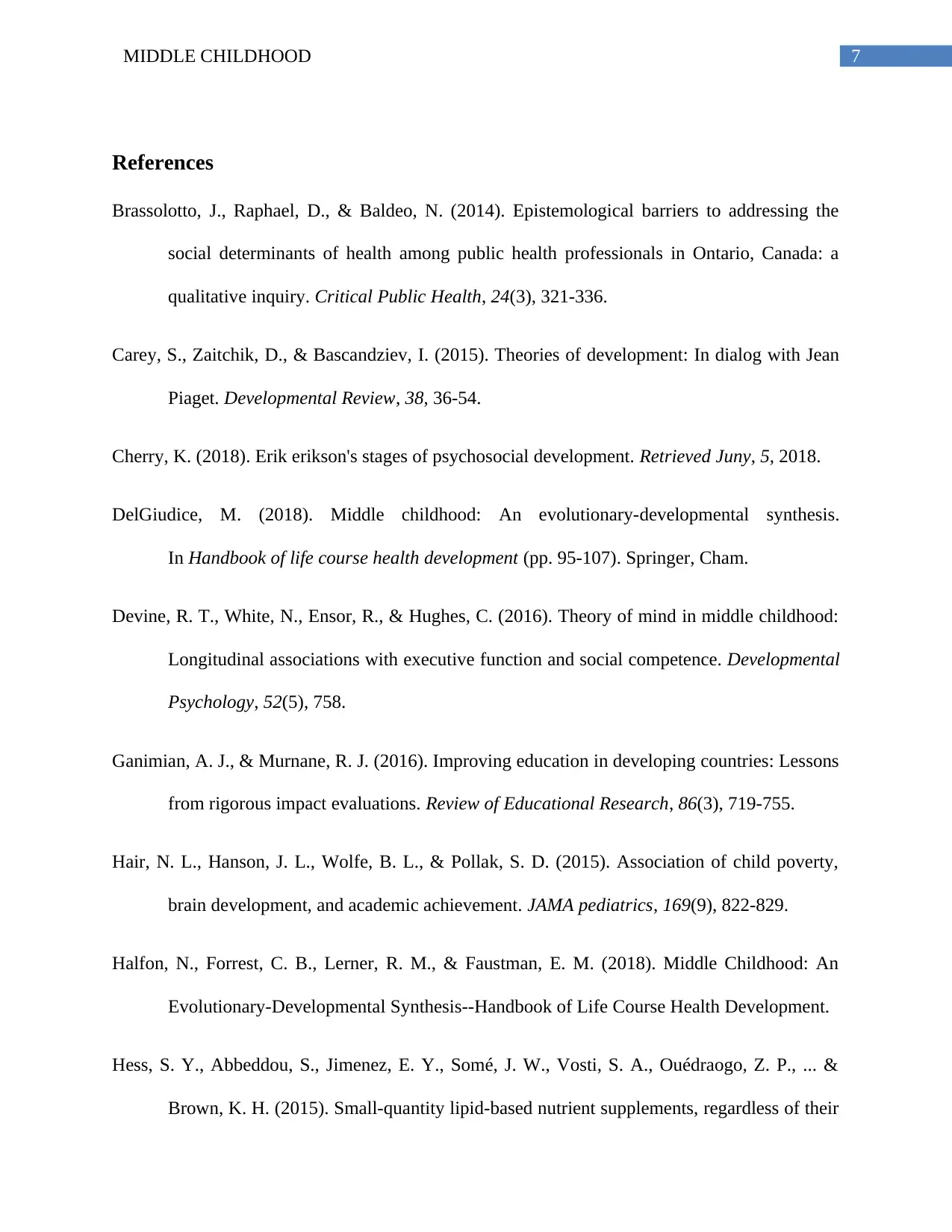
7MIDDLE CHILDHOOD
References
Brassolotto, J., Raphael, D., & Baldeo, N. (2014). Epistemological barriers to addressing the
social determinants of health among public health professionals in Ontario, Canada: a
qualitative inquiry. Critical Public Health, 24(3), 321-336.
Carey, S., Zaitchik, D., & Bascandziev, I. (2015). Theories of development: In dialog with Jean
Piaget. Developmental Review, 38, 36-54.
Cherry, K. (2018). Erik erikson's stages of psychosocial development. Retrieved Juny, 5, 2018.
DelGiudice, M. (2018). Middle childhood: An evolutionary-developmental synthesis.
In Handbook of life course health development (pp. 95-107). Springer, Cham.
Devine, R. T., White, N., Ensor, R., & Hughes, C. (2016). Theory of mind in middle childhood:
Longitudinal associations with executive function and social competence. Developmental
Psychology, 52(5), 758.
Ganimian, A. J., & Murnane, R. J. (2016). Improving education in developing countries: Lessons
from rigorous impact evaluations. Review of Educational Research, 86(3), 719-755.
Hair, N. L., Hanson, J. L., Wolfe, B. L., & Pollak, S. D. (2015). Association of child poverty,
brain development, and academic achievement. JAMA pediatrics, 169(9), 822-829.
Halfon, N., Forrest, C. B., Lerner, R. M., & Faustman, E. M. (2018). Middle Childhood: An
Evolutionary-Developmental Synthesis--Handbook of Life Course Health Development.
Hess, S. Y., Abbeddou, S., Jimenez, E. Y., Somé, J. W., Vosti, S. A., Ouédraogo, Z. P., ... &
Brown, K. H. (2015). Small-quantity lipid-based nutrient supplements, regardless of their
References
Brassolotto, J., Raphael, D., & Baldeo, N. (2014). Epistemological barriers to addressing the
social determinants of health among public health professionals in Ontario, Canada: a
qualitative inquiry. Critical Public Health, 24(3), 321-336.
Carey, S., Zaitchik, D., & Bascandziev, I. (2015). Theories of development: In dialog with Jean
Piaget. Developmental Review, 38, 36-54.
Cherry, K. (2018). Erik erikson's stages of psychosocial development. Retrieved Juny, 5, 2018.
DelGiudice, M. (2018). Middle childhood: An evolutionary-developmental synthesis.
In Handbook of life course health development (pp. 95-107). Springer, Cham.
Devine, R. T., White, N., Ensor, R., & Hughes, C. (2016). Theory of mind in middle childhood:
Longitudinal associations with executive function and social competence. Developmental
Psychology, 52(5), 758.
Ganimian, A. J., & Murnane, R. J. (2016). Improving education in developing countries: Lessons
from rigorous impact evaluations. Review of Educational Research, 86(3), 719-755.
Hair, N. L., Hanson, J. L., Wolfe, B. L., & Pollak, S. D. (2015). Association of child poverty,
brain development, and academic achievement. JAMA pediatrics, 169(9), 822-829.
Halfon, N., Forrest, C. B., Lerner, R. M., & Faustman, E. M. (2018). Middle Childhood: An
Evolutionary-Developmental Synthesis--Handbook of Life Course Health Development.
Hess, S. Y., Abbeddou, S., Jimenez, E. Y., Somé, J. W., Vosti, S. A., Ouédraogo, Z. P., ... &
Brown, K. H. (2015). Small-quantity lipid-based nutrient supplements, regardless of their
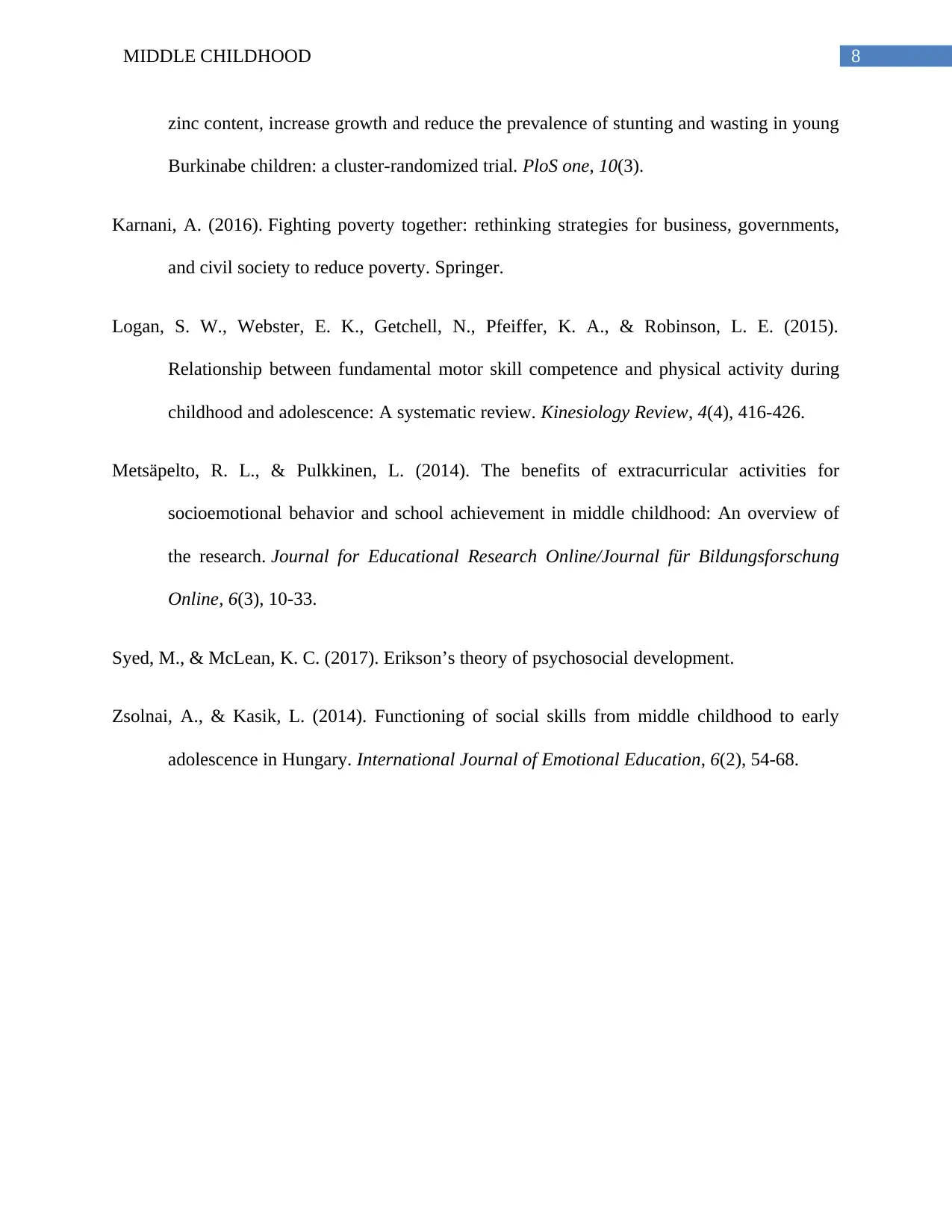
8MIDDLE CHILDHOOD
zinc content, increase growth and reduce the prevalence of stunting and wasting in young
Burkinabe children: a cluster-randomized trial. PloS one, 10(3).
Karnani, A. (2016). Fighting poverty together: rethinking strategies for business, governments,
and civil society to reduce poverty. Springer.
Logan, S. W., Webster, E. K., Getchell, N., Pfeiffer, K. A., & Robinson, L. E. (2015).
Relationship between fundamental motor skill competence and physical activity during
childhood and adolescence: A systematic review. Kinesiology Review, 4(4), 416-426.
Metsäpelto, R. L., & Pulkkinen, L. (2014). The benefits of extracurricular activities for
socioemotional behavior and school achievement in middle childhood: An overview of
the research. Journal for Educational Research Online/Journal für Bildungsforschung
Online, 6(3), 10-33.
Syed, M., & McLean, K. C. (2017). Erikson’s theory of psychosocial development.
Zsolnai, A., & Kasik, L. (2014). Functioning of social skills from middle childhood to early
adolescence in Hungary. International Journal of Emotional Education, 6(2), 54-68.
zinc content, increase growth and reduce the prevalence of stunting and wasting in young
Burkinabe children: a cluster-randomized trial. PloS one, 10(3).
Karnani, A. (2016). Fighting poverty together: rethinking strategies for business, governments,
and civil society to reduce poverty. Springer.
Logan, S. W., Webster, E. K., Getchell, N., Pfeiffer, K. A., & Robinson, L. E. (2015).
Relationship between fundamental motor skill competence and physical activity during
childhood and adolescence: A systematic review. Kinesiology Review, 4(4), 416-426.
Metsäpelto, R. L., & Pulkkinen, L. (2014). The benefits of extracurricular activities for
socioemotional behavior and school achievement in middle childhood: An overview of
the research. Journal for Educational Research Online/Journal für Bildungsforschung
Online, 6(3), 10-33.
Syed, M., & McLean, K. C. (2017). Erikson’s theory of psychosocial development.
Zsolnai, A., & Kasik, L. (2014). Functioning of social skills from middle childhood to early
adolescence in Hungary. International Journal of Emotional Education, 6(2), 54-68.
⊘ This is a preview!⊘
Do you want full access?
Subscribe today to unlock all pages.

Trusted by 1+ million students worldwide
1 out of 9
Related Documents
Your All-in-One AI-Powered Toolkit for Academic Success.
+13062052269
info@desklib.com
Available 24*7 on WhatsApp / Email
![[object Object]](/_next/static/media/star-bottom.7253800d.svg)
Unlock your academic potential
Copyright © 2020–2026 A2Z Services. All Rights Reserved. Developed and managed by ZUCOL.




